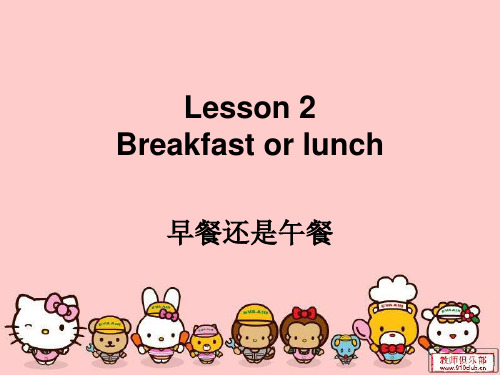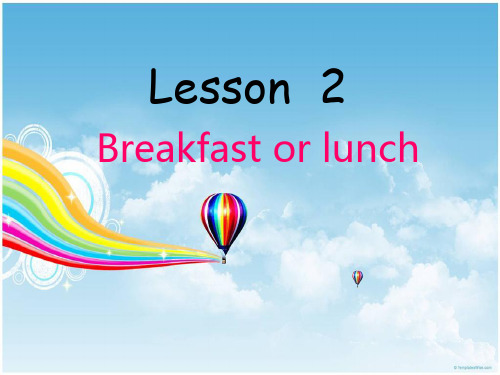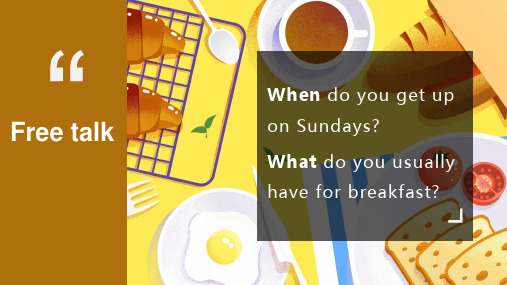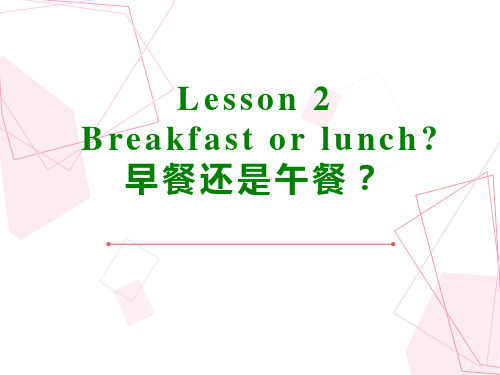最新新概念英语第二册lesson2讲义
新概念英语第二册Lesson2课件

P19练习题
Grammar
What a day! 鬼天气!
What an interesting story it is! What beautiful flowers they are! What nice weather it is! How lucky we are! How fast he runs! How quickly the time passed!
单项选择
1.--_________beautiful skirt !
-- Thank you.
A.What
B. What a
C. How
D. How a
2.___________exciting sport it is to go bike riding!
A. What a
B. What an
C. What
Read the text, and answer the question.
What do the writer always do? What did he do last Sunday? Who telephoned him? What did his aunt do? What did the writer say to his aunt? How was his aunt?
目录
1 W Grammar
Warm up
I stay in bed until lunchtime.
She always stays at home. She never goes out on weekends.
She always stays up until midnight.
D. How
3.__________fun it is to have ice cream in hot summer !
新概念英语第二册Lesson 2 _Breakfast_or_lunch

(1)What a day! What引导感叹句: 引导感叹句: 引导感叹句 1. what + a/an + adj. + n.(单数 + (主谓 单数) 主谓 主谓) 单数 eg: what a beautiful picture (it is)! ! 2. what + adj. + n.(复数 + (主谓 复数) 主谓 主谓) 复数 eg: what beautiful girls! (2) How interesting it is! How 引导的感叹句: 引导的感叹句: How + adj./adv. + (主谓 主谓) 主谓 How beautiful the picture is. P 18 exercise
aunt & uncle grandmother & grandfather mother-in-law & father-in-law grandson & granddaughter cousin 堂(表)兄弟姐妹 nephew侄子,外甥 & niece 侄女,外甥女
频率副词
• I never get up early on Sundays. “never” 频度副词 频度副词(0%) • 100% all the time 一直 • 90% almost, always 几乎,总是 几乎, • 60-70% often, frequently ['frikwəntlɪ]经常 ɪ • 20-30% sometimes, at times 有时 , • 5% rarely [‘rɛrlɪ] , hardly, seldom 很少,几乎不 [‘rɛrlɪ 很少, • 位于 、助动词后面,实意v.之前 位于be、助动词后面,实意 之前 • P18 exercise
新概念第二册英语 Lesson 2 课件

sweet dumplings
lantern riddles
I have lakes with no water, mountains with no stone and cities with no buildings.
What am I?
I’m tall when I’m young, and I’m short when I’m old.
Lesson 2 Breakfast or lunch? 早餐还是午餐? It was Sunday. I never get up early on Sundays. I sometimes
____st_a_y_i_n_b_e_d_____ until lunch time. Last Sunday I got up very late. I ___lo_o_k_e_d_o_u_t_o_f___ the window. It was dark outside. '__W__h_a_t _a_d_a_y__!' I thought. 'It's raining again.' ____J_u_s_t_t_h_en_____, the telephone rang. It was my aunt Lucy.' I've just arrived___b_y_t_r_ai_n__,' she said. 'I'm coming to see you.' 'But I'm still __h_a_v_in_g__ breakfast,' I said. 'What are you doing ?' she asked. ' I'm having breakfast,' I repeated. 'Dear me,' she said. 'Do you always get up so late ? It's one o'clock!''
新概念英语第二册第二课精品ppt课件

ring [rɪŋ]v. 铃, 电话铃响,门铃 ring-rang-rung
The door bell is ringing. n. 戒指,指环 earring 耳环
a wedding ring 结婚戒指
男性: uncle, (叔叔,伯伯,舅舅,伯父)
aunt [ɑːnt] n. 女性长辈(姑母, 他们的孩子:cousin 堂兄妹,表兄妹
5
Practice
1. ( B ) When Aunt Lucy telephoned
A. the writer was asleep.
B. the writer was still in bed.
C. the writer had already got up. D. the writer was having lunch.
rudely [ˈruːdli] adv. 无礼地,粗 rude adj.粗鲁的
鲁地
反义词:polite adj.礼貌的
3
Text
It was Sunday. I never get up early on Sundays. I sometimes stay in bed until lunchtime. Last Sunday I got up very late. I looked out of the window. It was dark outside. ‘What a day!’ I thought. ‘It’s raining again.’ Just then, the telephone rang. It was my aunt Lucy. ‘I’ve just arrived by train’, she said. ‘I am coming to see you.’ ‘But I am still having breakfast, ’ I said. ‘What are you doing?’ She asked. ‘I am having breakfast,’ I repeated. ‘Dear me!’ She said. ‘Do you always get up so late? It’s one o’clock!’
新概念英语第2册课程讲义Lesson2

Lesson2单词讲解1.until prep.直到until nowuntil lunchtime2.outside adv.外面insideupside down3.ring v.(铃,电话等)响ring rang rungsing sang sungdrink drank drunkswim swam swumbegin began begunring n.4.repeat v.重复re-retellrewriterediscoverRebroadcastLesson2课文&语法讲解一般现在时现在进行时感叹句一般现在时现在进行时时态?如何体现?一共多少种?一般现在时谓语v.=原形/第三人称单数(do/does)I tell you a secret.He tells you a secret.Your friend tells you a secret.一般现在时谓语v.=原形/第三人称单数(do/does)用法1:表示现在经常性习惯性的动作We have the English class every day.He often gets up late.always,usually,often,sometimes,never…一般现在时谓语v.=原形/第三人称单数(do/does)用法2:表示现在的状态I am a teacher.We are happy together.一般现在时谓语v.=原形/第三人称单数(do/does)用法3:表示永恒The earth is round.The earth moves around the sun.Practice makes perfect.一般现在时变否定/疑问现在进行时谓语v.=am/is/are+doing用法1:表示现在正在进行的事We are studying English now.J.K.Rowling is writing another book this year.现在进行时谓语v.=am/is/are+doing用法2:表示将来确定要发生的事I am coming to see you.We are arriving at....The old man is dying.现在进行时变否定/疑问He is listening.He is not listening.Is he listening?What is he doing?1.It was Sunday.2.I never get up early on Sundays.3.I sometimes stay in bed until lunchtime.4.I looked out of the window.5.It was dark outside.6.'What a day!'I thought.感叹句:What+n./n.词组!How+adj./adv.! What a wonderful world!How interesting!7.'It's raining again.’8.Just then,the telephone rang.9.It was my aunt Lucy.10.'I've just arrived by train,'she said.11.'I'm coming to see you.’12.'But I'm still having breakfast,'I said.13.'What are you doing?'she asked.14.'I'm having breakfast,'I repeated.15.'Dear me,'she said.16.'Do you always get up so late?17.It's one o'clock!'Lesson2知识拓展本课重点:一般现在时do/does 现在进行时am/is/are+doing一般现在时/现在进行时Right now I’m in class.I(sit)_______________at my desk.I usually(sit)_______________at the same desk in class every day.一般现在时/现在进行时Right now I’m in class.I am sitting at my desk.I usually sit at the same desk in class every day.一般现在时/现在进行时Ali(speak)_______________Arabic.Arabic is his native language,but right now he(speak)_______________English.一般现在时/现在进行时Ali speaks Arabic.Arabic is his native language,but right now he is speaking English.一般现在时/现在进行时A:(it,rain)_______________a lot in southern California?B:No.The weather(be)_______________usually warm and sunny.一般现在时/现在进行时A:Does it rain a lot in southern California?B:No.The weather is usually warm and sunny.一般现在时/现在进行时A:I’ll take those-the yellow flowers.B:Here you are,mister.Are they for a special occasion?A:I(buy)_______________them for my wife.I(buy)_______________her flowers on the first day of every month.一般现在时/现在进行时A:I’ll take those-the yellow flowers.B:Here you are,mister.Are they for a special occasion?A:I am buying them for my wife.I buy her flowers on the first day of every month.本课重点:一般现在时do/does 现在进行时am/is/are+doing。
新概念英语第二册Lesson2说课讲解

【New words 】
1 until prep. 直到 2 outside adv. 外面 3 ring v. (铃、电话等)响 4 aunt n. 姑,姨,婶,舅母 5 repeat v. 重复
★until prep. 直到
until 用 于表示动
Reading
Predict:
1.What do you think this passage will talk about after reading the title?
2.What is the main idea of the passage?
I always get up late on Sundays. And my aunt was surprised that I was still having breakfast in the afternoon last Sunday.
to wait just outside the door
3. ring (rang, rung)
动词 ①鸣,响(铃,电话等) eg. Every moring the clock ring at 6.
The telephone is ringing. ①打电话给
ring sb. eg. Tomorrow I'll ring you.
直到中午雨才停止。
I did not learn it until yesterday . 到昨天我才知道。
He did not show himself in his true colors until he gained power. 直到他掌权之后,他才露出自己的真 面目。
新概念英语第二册Lesson2(共62张PPT)

Who? Which? What?
How?
Where?
When?
1. a tree in the corner of the garden he planted 2. we at home stay on Sundays 3. the match at four o'clock ended 4. before lunch the letter in his office quickly he read
一个简单陈述句可以由六部分组成,但是并不是所有 句子都有这么多组成部分,而是包含其中的某几个。 这六部分的排列顺序是基本固定的。
When
Who? Which? What?
Action
Who? Which? What?
How?
Where?
When?
练习题
When? Who? Action Which? What?
直宾
宾语:句子中动 词的接受者;
S + V(vt) + IO + DO 5 基本句型五:主+ 谓+ 宾+ 补
S + V(vt) + DO + OC
During the trip
an angry zookeeper
基本句型五
补充说明宾语,与 之有逻辑关系
We call the man ‘zookeeper’.
Lesson 2 Breakfast or lunch?
Lesson 1 A private conversation
• 上星期我去看戏. 我的座位很好, 戏很有意思, 但我却无法欣赏. 一青年男子与一青年女子坐 在我的身后, 大声地说着话. 我非常生气, 因 为我听不见演员在说什么. 我回过头去怒视着 那一男一女, 他们却毫不理会. 最后, 我忍不 住了, 又一次回过头去, 生气地说 : “我一个 字也听不见了!”
(完整版)新概念英语第二册lesson2讲义

Lesson 2 Breakfast or lunch?一、教学重点1、代词:it做虚主语时的用法。
2、时态:一般现在时VS现在进行时。
3、副词:频率副词的排序和位置二.知识重点1. It was Sunday.这里的it是虚主语,可以指代时间、天气、温度、距离等多种事物,也可以指代某个不确定的人。
2. I never get up early on Sundays.never从来不、绝对不。
频率副词,可以用在多种时态中。
Never give up.从不放弃Never lose heart. 绝不要灰心丧气。
on Sundays 在每一个星期天。
on用在具体的某一天之前,例如on March 21st,on Monday,on Monday morning 在这里Sundays用了复数,表示在每一个星期天。
3. I sometimes stay in bed until lunchtime.Sometimes 有时Some times 几次几倍Some time 一段时间Sometime 有时用于将来时或者过去时中Stay in bed 躺在床上stay at home 待在家里Until 1)prep 直到……时候I sometimes stay in bed until lunchtime.2)conj 直到……时候后接句子肯定句中的动词为延续性动词否定句中为非延续性动词I won't stop shouting until you let me go.Continue in this direction until you see a sign4. Last Sunday , I got up very late.Get up 起床go to bed 去睡觉fall asleep 睡着Late adj/adv 晚Stay up late 熬夜Lately: recently 最近常用在完成时和一般过去时中。
新概念英语第二册第2课ppt课件

;.
18
It’s raining.
I never get up early on Sundays.
• I’m coming to see you.
• I sometimes stay in bed until lunch time.
• I’m still having breakfast.
• Do you always get up so late?
•
I am reading in bed.
• Do you ever read in bed?
;.
19
;.
6
• until /ʌn'til/ 1. prep. 直到...时,到...为止 Will this fish keep until tomorrow? 这鱼能搁到明天吗? 2. (用于否定句) 直到...(才) not... until... She didn't go to bed until eleven o'clock. 她直到十一点才上床睡觉。 He didn't turn off the light until his mother came back. 他直到她妈妈回来才关灯。
;.
15
never<seldom<sometimes< often<usually<always
新概念英语第二册课课件 Lesson

•A public house which was recently bought by Mr. Ian Thompson is up for sale.
•a public house 酒吧、酒店,口语缩略为pub •up for sale 有待出售,供出售 •be up for 有待于…,为了某一目的 •This problem is up for discussion. •这个问题有待于讨论。 •on sale 打折卖 for sale 待售;出售
• ★shake(shook,shaken) v. 摇动 • vt.&vi. 摇,摇动,抖动 • Mr. Thompson shook his head. • His hands appear to be shaking. • 他的手看上去在发抖。 • ② vt. 同…握手 • Dan shook hands with him.
A public house which was recently bought by Mr. Ian Thompson is up for sale. Mr.Thompson is going to sell coming from the bar. The next morning, he found that the doors had been blocked by chairs and the furniture had been moved. Though Mr.Thompson had turned the lights off before he went to bed, they were on in the morning.He also said that he had found five empty whisky bottles which the ghost must have drunk the night before. When I suggested that some villagers must have come in for a free drink, Mr.Thompson shook his head. The villagers have told him that they will not accept the pub even if he gives it away.
新概念英语第二册Lesson 2

文化背景
早餐吃什么 V.S. 午餐怎么吃
歪果仁 早餐吃什么
New words and expressions
• until [ʌn'til]
If something happens until a particular time, it happens during the period before that time and stops at that time. 直到...才;直到...为止
it 的用法 1)人称代词 一般代指无生命的东西或有生命的动物,在不分性别或情况不详时指代 This is my watch. It's a Swiss one. The baby smiled when it saw its mother. 2)用作无人称动词的主语时,表示“时间、天气、距离” It's quite early yet. It's getting dark outside. It's not far from here. It's so cold now.
New words and expressions
• aunt [ɑːnt] [ænt]
the sister of your father or mother; the wife of your uncle
姨母; 舅母; 姑母; 伯母; 婶母
uncle ['ʌŋkl]
the brother of your father or mother; the husband of your aunt 叔叔;伯父;伯伯;舅父;姨丈;姑父
Notes on the text
Lesson2Breakfastorlunch讲义-高中英语新概念第二册

新概念英语第二册第2课Lesson 2 Breakfast or lunch? 早餐还是午餐?课文内容:It was Sunday. I never get up early on Sundays. I sometimes stay in bed until lunchtime. Last Sunday I got up very late. I looked out of the window. It was dark outside. ‘What a day!’ I thought. ‘It's raining again. ’ Just then, the telephone rang. It was my aunt Lucy. ‘I've just arrived by train, ’ she said. ‘I'm coming to see you. ’‘But I'm still having breakfast, ’ I said.‘What are you doing?’ she asked.‘I'm having breakfast, ’ I repeated.‘Dear me, ’ she said. ‘Do you always get up so late? It's one o'clock!’New words and expressions 生词和短语until prep. 直到outside adv. 外面ring(rang,rung) v. (铃、电话等)响aunt n. 姑,姨,婶,舅母repeat v. 重复参考译文那是个星期天,而在星期天我是从来不早起的,有时我要一直躺到吃午饭的时候。
上个星期天,我起得很晚。
我望望窗外,外面一片昏暗。
“鬼天气!”我想,“又下雨了。
”正在这时,电话铃响了。
是我姑母露西打来的。
新概念英语第二册Lesson2完整课件

③ n. (打)电话 give sb. a ring 记得打电话给我! Remember to give me a ring.
④ n. 戒指 wedding ring
aunt n. 姑,姨,婶,舅妈 uncle n.叔叔,舅舅,姑父 他们的孩子:cousin[ˈkʌzn] 堂兄妹(不分男女) cousin的孩子:
'Do you always get up so late? It's one o'clock!'
I'm coming to see you. 用 come 的现在进行时态 be coming 表示一般将来,表示 近期按计划或安排要进行的动作。 同样用法的动词有: go,come,leave,arrive… 你马上就要离开吗? Are you leaving at once? 明天他就到了。 He is arriving tomorrow.
repeat v. 重复 不要重复! Don't repeat!
他们正在重复那个有趣的游戏。 They are repeating that interesting game.
Why was the writer's aunt surprised?
It was Sunday. I never get up early on Sundays . I sometimes stay in bed until lunchtime. Last Sunday I got up very late. I looked out of the window. It was dark outside . 'What a day!' I thought. 'It's raining again.' Just then, the telephone rang . It was my aunt Lucy. 'I've just arrived by train,' she saidSu.nd'aI'yms coming to see you.'
新概念英语第二册第2课课件

Grammar 现在进行时==》一般现在时
Now:
Often and always:
It's raining.
I never get up early on Sundays.
I'm coming to see you.
I sometimes stay in bed until lunchtime.
"I'm still having breakfast." 7)Was his aunt very surprised or not?
Yes,she was very surprised. 8)What was the time?
It's one o'clock.
Key sentences
He always gets up late. He got up very late last Sunday. His aunt Lucy telephoned then . She dad just arrived by train. She was coming to see him. "I'm still having breakfast." She was very surprised. It's one o'clock.
Complete the passage based on the text !
I'm still having breakfast.
Do you always get up so late?
What are you doing?
I often buy CDs.
She's reading in bed now.
新概念英语第二册Lesson1_Lesson2完整版

5、状语是动词或形容词前面的连带成分, 用来修饰、限制动词或形容词,表示动作的状态、方 式、时间、处所或程度等.
6、补语是动词或形容词后面的连带成分,述补结构 中补充说明述语的结果、程度、趋向、可能、状态、 数量等的成分.
基本句型
• 一、主语+谓语+宾语 • All of us love science. • I wrote a book.
• 'It's none of your business,' the young man said rudely. 'This is a private conversation!'
Explain the text
1.重点短语:go to the+地点 表示去某地干嘛 eg: in hospital 住院 in the hospital 去医院 go to the school 去学校 go to school 上学 表明你的身份一定是学生,是去上 学的,而加了定冠词the之后表明你的身份不定了. 相同的还有church和hospital等.
11. business n. 事,生意 talk business 谈正事
12. rudely adv. 粗鲁地 形容词形式为:rude 粗鲁的
9. attention n. 注意
Attention,please! 请注意!
pay attention to sb./sth. 注意人/某 事
pay no attention pay little attention pay close attention pay more attention
- 1、下载文档前请自行甄别文档内容的完整性,平台不提供额外的编辑、内容补充、找答案等附加服务。
- 2、"仅部分预览"的文档,不可在线预览部分如存在完整性等问题,可反馈申请退款(可完整预览的文档不适用该条件!)。
- 3、如文档侵犯您的权益,请联系客服反馈,我们会尽快为您处理(人工客服工作时间:9:00-18:30)。
Lesson 2 Breakfast or lunch?
一、教学重点
1、代词:it做虚主语时的用法。
2、时态:一般现在时VS现在进行时。
3、副词:频率副词的排序和位置
二.知识重点
1. It was Sunday.
这里的it是虚主语,可以指代时间、天气、温度、距离等多种事物,也可以指代某个不确定的人。
2. I never get up early on Sundays.
never从来不、绝对不。
频率副词,可以用在多种时态中。
Never give up.从不放弃
Never lose heart. 绝不要灰心丧气。
on Sundays 在每一个星期天。
on用在具体的某一天之前,例如on March 21st,on Monday,on Monday morning 在这里Sundays用了复数,表示在每一个星期天。
3. I sometimes stay in bed until lunchtime.
Sometimes 有时
Some times 几次几倍
Some time 一段时间
Sometime 有时用于将来时或者过去时中
Stay in bed 躺在床上stay at home 待在家里
Until 1)prep 直到……时候
I sometimes stay in bed until lunchtime.
2)conj 直到……时候后接句子
肯定句中的动词为延续性动词否定句中为非延续性动词
I won't stop shouting until you let me go.
Continue in this direction until you see a sign
4. Last Sunday , I got up very late.
Get up 起床go to bed 去睡觉fall asleep 睡着
Late adj/adv 晚
Stay up late 熬夜
Lately: recently 最近常用在完成时和一般过去时中。
5. I looked out of the window.
Look out of…向……外看
Look into 向……里面看;调查
Look out ! 当心小心
6. What a day! 省略式感叹句。
= What a day it is! = What a bad/terrible day it is!
构成:What + 名词(包括冠词和形容词) + 主语代词+ 谓语动词+ ! 对照:How + 形容词/副词+ 主语(名词/代词) + 谓语动词+ !
7.Just then, the telephone rang.
then 然后,那时。
just 就,仅仅。
just then = at that moment 就在那时
ring [vi.] 不及物动词。
The bell rings. The phone rang.
ring [vt.] 及物动词。
ring sb. = call sb.
ring 名词环状物,特指戒指
a wedding ring 结婚戒指
ring finger无名指
thumb 拇指
index/the first finger/pointer食指
middle finger/the second finger中指
little finger/pinkie 小手指
8.I’ve just arrived by train. 这里的just是刚刚的意思,用于完成时。
例句:-Have you finished your homework? -I have just finished it.
by +具体的交通工具:by bus/bike/ship/air/plane.... ;on foot
9. I’m coming to see you. 用现在进行时表将来,表示即将、马上发生
的事。
可用于这种情况的词:go,leave,arrive,die等。
例句:I’m leaving now. I’m dying. The train is arriving in five minutes 10. Dear me! 这也是一个感叹句。
= Oh, my God! = My dear! = Goodness! = Good heavens!
三.语法讲解
辨析一般现在时和现在进行时
一般现在时:
构成:1.含有be动词的句子
2.含有实义动词句子
功能:
1.表达习惯性和规律性的动作
2.
3.表达现在的事实或者动作
Birds fly.
4.客观真理,格言警句或事实
The earth moves round the sun.
Seeing is believing.
经常搭配的副词:
Often, sometimes, usually, always, every year, seldom, frequently occasionally.
现在进行时
构成:be+v-ing
功能:
1.
2.表示现在目前正在进行的动作
3.
4.表示现阶段正在进行的动作
We are studying English in summer.
用进行时表示即将开始的动作
Go/come /leave /arrive /land/ meet/ die /start/ return/ join 等
副词用在进行时中表示说话人的感情色彩
Always /forever /continually/ constantly
He is always helping others.
5.下列表示状态,感觉,情绪,精神活动的动词不用于进行时。
Believe、understand、belong to、feel、seem、mind、have、sound、taste、require、care、hate、like、等。
